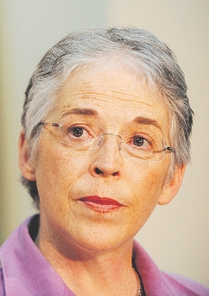Children can go to school despite mothers’ status
By Gerry Bellett, Vancouver Sun, Mar. 5 2011
Education Minister Margaret MacDiarmid says even if mothers don’t have residency status, children are not foreign students. The head of the Vancouver YWCA said Friday she is encouraged that provincial authorities are promising Canadian children whose mothers don’t have residency status will have access to medical, social and educational services. “So far there has been a lack of clarity on how the needs of some of these women and children are met. We have approached the government about these problems and there seems to be a willingness to move forward,” said Janet Austin, CEO of the Vancouver YWCA.
Earlier this week, the YWCA released a report showing some of these children were being denied benefits because of their mother’s residency status.
These women all came to Canada legally — either on visitors’ permits, student visas or temporary work permits — and had relationships with Canadian residents, which resulted in children. But the relationships ended, often because the women were physically abused and they fled, before they could acquire permanent resident status.
The report said some children were not attending school because their mothers had been told they must pay the $12,000 annual fee charged to foreign students.
However, Education Minister Margaret MacDiarmid said the immigration status of a child’s parent “does not determine whether or not a child can attend school in British Columbia.” In a letter to The Vancouver Sun, Mac-Diarmid said that under the School Act, any child who lives in the province is “entitled to a free education.”
She said the determination of residency is made by individual school districts when a parent applies to have their child enrolled.
According to Austin, the mothers of two Canadian-born children were attempting to enrol them in Surrey schools, but were told they would have to pay $12,000.
Surrey school board spokesman Doug Strachan said the provisions of the School Act regarding residency were vague and could result in Canadian-born children being regarded as international students.
“The act says the student and the guardian of the student must be residents of B.C. So it’s not just the student that has to be a resident, it is their parent or guardian as well,” said Strachan.
Told that the education minister had said such an interpretation of the act was incorrect, Strachan said it would be helpful if the ministry would be unequivocal about the issue, as “from our interpretation of the [residency] clause, that is what the law says we must do.”
Austin said she was glad to hear MacDiarmid’s response and hoped those school districts insisting on the $12,000 payment would fall into line.
“There are others besides Surrey who have similar policies.” she said.
However, the Vancouver school district is not one. “We’ve received assurances from the YWCA that we are not one of the districts they have concerns about,” said Vancouver school district official David Weir.
“Ensuring students have access to education is a top priority of this board,” Weir said. Austin said that the YWCA has had to pay the medical insurance premiums of some children in order for them to receive benefits as their mothers, who were staying in transition homes, couldn’t afford the premiums.
MacDiarmid said the province “is very concerned about the difficult circumstances these women and children have been forced into, and we recognize their need for financial assistance.
That is why the Ministry of Social Development has been actively exploring options it can take to assist these vulnerable families.
“All avenues are being pursued to help on an interim and long-term basis, while at the same time ensuring any assistance given does not inadvertently jeopardize applications for citizenship.
“All cases brought to our attention have been addressed based on their unique circumstances.
“In addition, we are pursuing working with the federal government as changes to current immigration laws are key to addressing many of the obstacles these women are facing.
“It is also important to note that no one is turned away if they cannot pay their medical expenses,” she said.
gbellett@vancouversun.com
© Copyright (c) The Vancouver Sun




